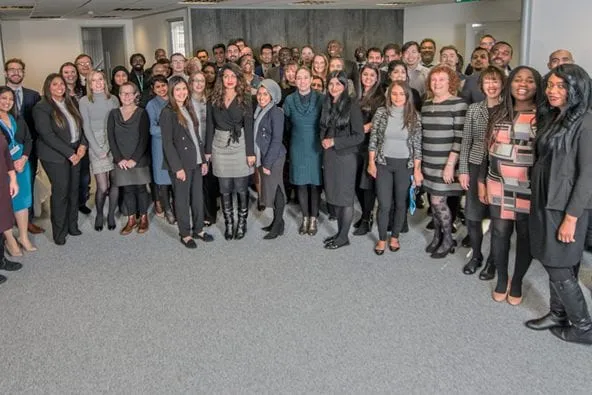Equality, Diversity, and Inclusion for Employers
UK employment law enforces anti-discrimination rules that reach even the recruitment process, which is why employers ought to make sure that their staff is equipped to conform to these regulations in daily undertakings and workplace policies.
If you need thorough guidance on ensuring compliance with equality, diversity, and inclusion regulations in your workplace, call our experienced employment solicitors at 0333 305 9375.
Read our 1001 reviews
Request a call back from our immigration experts
What are the benefits of choosing IAS’ Advice Package?
Our Advice Package is the ideal option if you are looking for expert immigration legal advice. With this service, you will have a one-on-one session with one of our immigration lawyers.
Your immigration lawyer will consider your case and offer bespoke advice, and they will advise you on the optimum route to take to achieve your desired result.
During your advice session, you will be able to discuss your case and get detailed information about your options to proceed with your case. We will:

Review your situation and explore your opportunities to get your desired immigration results.



Advice on the most appropriate documentary evidence required to support your case.



Discuss the requirements that you need to meet to qualify for your visa.



Outline the expected time frames to process your application.
Services we Provide
quality, Diversity, and Inclusion (EDI) in The Workplace – An Overview
As time passes, we hear the words “equality”, “diversity”, and “inclusion” more often, especially in the context of employment.
Contrary to popular belief, “equality”, “diversity”, and “inclusion” are not synonymous with each other, though they may be used interchangeably in everyday speech, and their definitions often overlap. Furthermore, they’re not specifically legal terms but have been adopted among HR practitioners.
While equality comes in more during the employment process, diversity and inclusion are more relevant during the course of employment or in any workplace.
We will go over each of these concepts in-depth to help you as a UK employer to know what your responsibility is when it comes to HR, UK employment law and these matters. For legal guidance to ensure your workplace is well-placed regarding equality, diversity, and inclusion, get in touch with our employment lawyers today at 0333 305 9375.
What is Equality in Employment?
Equality, for the purposes of employment, relates to the creation of conditions that generate equal opportunities and access for all. This does not translate into everyone getting the exact same treatment, for not everyone is the same.
Rather, equality in this context is analogous to offering “fair treatment” to different groups so that they’re not overlooked or demeaned on account of their “protected characteristics”.
Protected Characteristics (Equality Act)
More specifically, the Equality Act 2010 lists the following as protected characteristics:
- Age
- Race
- Gender reassignment
- Marriage or civil partnership
- Pregnancy / maternity
- Religion
- Sex and sexual orientation
As an employer, you must do what you can to avoid harassment or discrimination amongst staff members through various initiatives, such as laying out disciplinary actions against discriminatory behaviours in the workplace or giving proper training to your personnel on the subject of equality.
What is Diversity in the Workplace?
A diverse workplace concerns how many ethnicities, ages, religions, genders, and disabilities are found within your workforce and the value given to these different groups.
As an employer, you must do everything in your power to promote equality and respect for all cultural backgrounds and peculiarities and bring about acceptance towards a diverse workplace with all the benefits that come with that.


What is Inclusion?
“Equality” and “diversity” are concepts often coupled with the term “inclusion”, which denotes a practice that goes beyond mere fair treatment. Inclusive workplaces, within this paradigm, should allow everyone to voice their ideas, opinions, and suggestions freely and to feel that they’re being valued, regardless of their protected characteristics.
Implementing an efficient inclusion strategy should help lower instances of discrimination, bullying, or harassment.
Inclusion implies accepting individuals as they are and breaking down any prejudices or preconceived notions. This translates into HR practices that promote tolerance towards peculiar actions or practices from individuals of different cultures and disabilities inside the workplace, as long as these are conducted within due limits.
How do I Make Employees Feel Included?
The Acas has given several guidelines that might help HR managers and employers deal with situations in which an employee has expressed feeling excluded. In a nutshell, as an employer or HR manager, you should:
- Talk openly with employees.
- Show how important their contribution to the company is.
- Ask how they feel working for the company or team
- Analyse how you’ll be able to help them.
Equality, Diversity, and Inclusion in Employment Law and Good Practice
UK’s Employment law only gives a handful of provisions in relation to equality. They are:
- Equal pay: Women and men should receive the same wages for assuming the same (or similar) roles.
- The obligation to not discriminate against job applicants during recruitment, nor against staff members in terms of promotions, benefits, and other workplace topics.
- The mandate to perform actions targeted toward preventing discrimination and harassment between people in the workforce.
- Employers with 250 or more employees must submit an annual gender pay gap report showing the company’s average pay of women and men.
In practice, many large employers have shown commitment to instructing their HR divisions to keep up with the latest trends in staff management and EDI practices. By custom, many companies have also devised an “equality and diversity policy” to be included within their staff handbooks, even though this is not strictly mandatory by law.
Regarding the gender pay gap report, employers should not conceal pay gaps if there are any. However, it’s also a good idea to include details about actions and policies that you’re taking to shorten the gap and ensure that both genders are treated equally in this respect.
Equality, Diversity, and Inclusion Rules for Employers in the Public Sector
The PSED stands for Public Sector Equality Duty and consists of a legal duty that applies to anyone who works for or does work on behalf of the public sector. These duties should be carried out whenever the public sector employer deals with employees, service users, and policymaking.
Employers who must abide by PSED according to schedule 19 of the Equality Act 2010 include local government, the civil service, the police, transport bodies, the NHS, and schools. However, the list contained in the schedule is quite extensive.
Furthermore, the Human Rights Act states in article 14 that no one, including public authorities or persons, should discriminate based on race, sex, colour, religion, language, political or other opinions, social background, etc.
Those under the scope of PSED must do anything in their power to:
- Deter any chances of discrimination, victimisation, and harassment towards customers, users, and employees.
- Aid in upholding equality in the organisation’s daily errands.
- Promote healthy relations between people who share or don’t share protected characteristics.
Employer’s Responsibilities for Employee’s Actions
This is a very important topic that you should be mindful of as an employer, for it’s a very overlooked issue that could cause serious problems down the road if you are not aptly prepared.
In typical circumstances, liability is personally assumed. In the case of employers, they could have “vicarious liability” due to certain actions on the part of their employees, particularly discriminatory behaviour.
Examples of actions that could elicit employment tribunal claims of discrimination in the workplace include negative remarks made by a teammate to an employee based on the latter’s race, gender, or sexual orientation. In that scenario, you may be held responsible if you did not take disciplinary measures against the offender.
“Vicarious liability” is a very intricate subject. If you feel that you could be summoned by an employment tribunal to give an account for an employee’s harassment, bullying, or discrimination against a peer, you should contact an expert employment solicitor to help address this problem.


How IAS Law Can Help
Complying with regulations on the subject of Equality, Diversity, and Inclusion is not an easy endeavour. Without competent, many employers can be exposed to suffering steep consequences. Furthermore, there’s ample attestation to the fact that an inclusive business tends to fare better on the market and boost productivity.
Our team of employment solicitors has proven expertise in Equality, Diversity, and Inclusion issues and policymaking. We make it our duty to do the heavy lifting when it comes to handling legal paperwork related to EDI and ensuring you are set on the correct path in these matters.
Call us at 0333 305 9375 to learn more about our services. Our lawyers are at your disposal for any query or consultation.
Table of Contents
Table of Contents will appear here.Legal Disclaimer
The information provided is for general informational purposes only and does not constitute legal advice. While we make every effort to ensure accuracy, the law may change, and the information may not reflect the most current legal developments. No warranty is given regarding the accuracy or completeness of the information, and we do not accept liability in such cases. We recommend consulting with a qualified lawyer at Immigration Advice Service before making any decisions based on the content provided.
Frequently Asked Questions
Provided that you made attempts to mend the fence beforehand, employees who still can’t agree with your company’s values after giving them a chance to express their concerns are free to leave.
Nevertheless, it’s always good practice to arrange exit interviews with them to gather their feedback or find out the reasons behind the resignation (and whether they felt excluded at some point).
Bullying is a type of behaviour that intimidates and humiliates a person through insults or even physical violence. If bullying becomes a repeated behavioural pattern and is motivated by membership in different groups with protected characteristics, it could be deemed as harassment, which is an actionable offence.
Discrimination consists of granting unfair treatment to parties with protected characteristics, even if the discriminatory action is not offensive. For example, holding back from promoting a person due to certain protected characteristics could be construed as discrimination, even though it’s not as easy to prove as harassment is.
You could take anonymous surveys at different workplaces to get an idea of the general sentiment regarding your EDI policies and how they’re being carried out or received. Large companies tend to hand out equality and diversity monitoring forms to both job applicants and employees for this same purpose.


What our clients are saying
How our UK Immigration Lawyers can help
At the Immigration Advice Service our lawyers specialise in a wide range of UK visas, nationality and asylum applications and have represented clients in various successful complex and high-profile cases.

















